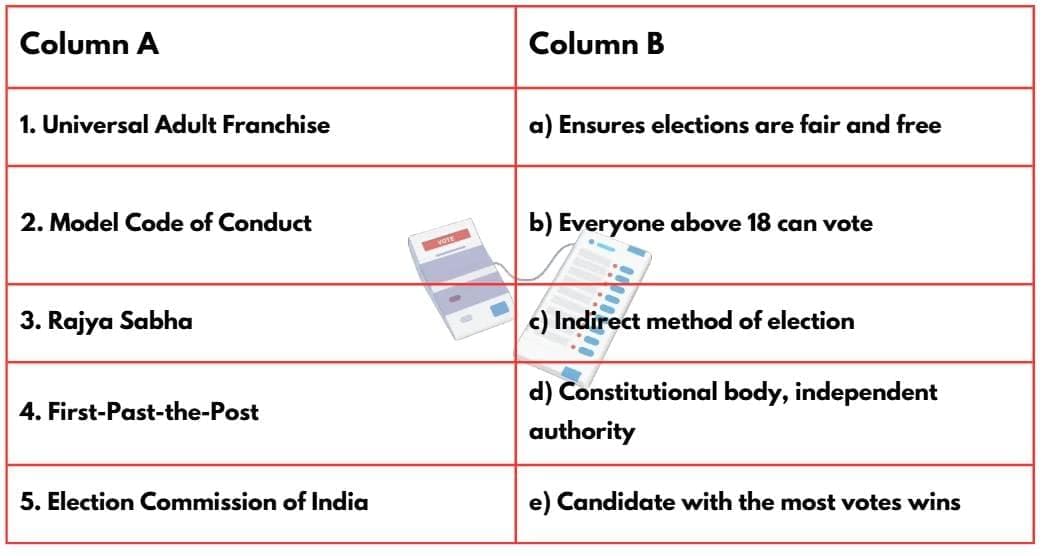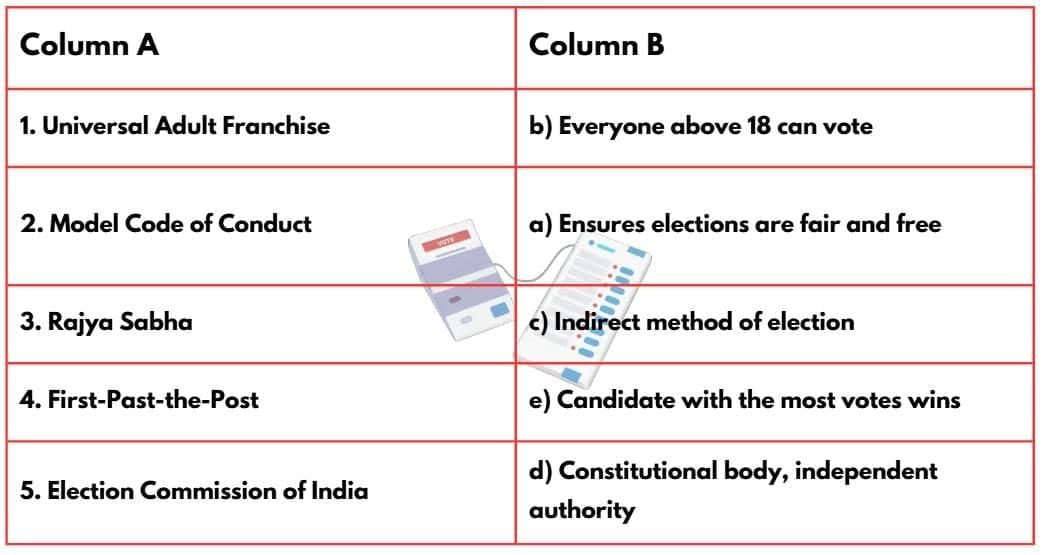Worksheet Solutions: Universal Franchise and India’s Electoral System | Worksheets with Solutions for Class 8 PDF Download
| Table of contents |

|
| Multiple Choice Questions (MCQs) |

|
| Match the Following |

|
| True or False |

|
| Fill in the Blanks |

|
| Very Short Answer Questions |

|
Multiple Choice Questions (MCQs)
Q1. What is the minimum age to vote in India?
(a) 16 years
(b) 18 years
(c) 21 years
(d) 25 years
Ans: (b) 18 years
Indian citizens aged 18 and above have the right to vote under the universal adult franchise.
Q2. Which Article of the Indian Constitution ensures the universal adult franchise?
(a) Article 324
(b) Article 21
(c) Article 326
(d) Article 14
Ans: (c) Article 326
Article 326 provides for elections to the Lok Sabha and Legislative Assemblies based on universal adult suffrage.
Q3. Which body is responsible for conducting free and fair elections in India?
(a) Parliament of India
(b) Supreme Court of India
(c) Election Commission of India
(d) Planning Commission
Ans: (c) Election Commission of India
The ECI is a constitutional body responsible for managing elections independently.Election Commission of India
Q4. How many constituencies are there for Lok Sabha elections?
(a) 545
(b) 500
(c) 543
(d) 520
Ans: (c) 543
There are 543 elected Lok Sabha constituencies across India.
Q5. Members of the Rajya Sabha are elected by:
(a) The citizens of India directly
(b) Members of State Legislative Assemblies
(c) The President of India
(d) Governors of States
Ans: (b) Members of State Legislative Assemblies
Rajya Sabha elections are held indirectly through elected MLAs.
Q6. Which voting system is used in Lok Sabha elections?
(a) Proportional Representation
(b) Single Transferable Vote
(c) First-Past-the-Post
(d) Indirect Voting
Ans: (c) First-Past-the-Post
The candidate with the highest votes in a constituency wins.
Q7. The “Festival of Democracy” refers to:
(a) Cultural festivals in India
(b) General Elections
(c) Independence Day celebrations
(d) Republic Day
Ans: (b) General Elections
General elections are celebrated as the "Festival of Democracy" in India.
Q8. The President of India is elected by:
(a) All Indian citizens
(b) Judges of the Supreme Court
(c) An Electoral College of MPs and MLAs
(d) Only MPs of Lok Sabha
Ans: (c) An Electoral College of MPs and MLAs
The President is chosen indirectly by MPs and MLAs using proportional representation.
Q9. Who was the Chief Election Commissioner famous for strict electoral reforms in the 1990s?
(a) Sukumar Sen
(b) Rajiv Gandhi
(c) T.N. Seshan
(d) K.R. Narayanan
Ans: (c) T.N. Seshan
He introduced voter IDs, stricter campaign rules, and spending regulation.T.N. Seshan
Q10. One major challenge of India’s elections is:
(a) Small population
(b) Lack of diversity
(c) Money power and criminalization in politics
(d) Limited number of eligible voters
Ans: (c) Money power and criminalization in politics
These issues undermine fairness in Indian elections.
Match the Following

Ans:
True or False
Q1. Every Indian citizen above 21 years can vote.
Ans: False
The voting age is 18 years, not 21.
Q2. The Lok Sabha has 543 constituencies for elections.
Ans: True
There are 543 directly elected Lok Sabha seats.
Q3. The Rajya Sabha never dissolves completely.
Ans: True
It is called the Permanent House, with one-third retiring every two years.
Q4. Women in India got the right to vote in 1950, much later than in Switzerland.
Ans: False
India granted women suffrage from the start, while Switzerland did so in 1971.
Q5. The Election Commission of India was established in 1950.
Ans: True
It has been functioning since 1950 as per the Constitution.
Q6. The Model Code of Conduct prevents political leaders from misusing government resources during elections.
Ans: True
It ensures fairness by limiting undue influence during elections.
Fill in the Blanks
Q1. The right to vote in India is based on ______ adult franchise.
Ans: Universal
Q2. The Chief Election Commissioner in the 1990s who brought strict reforms was ______.
Ans: T.N. Seshan
Q3. Lok Sabha members are also called ______.
Ans: Members of Parliament (MPs)
Q4. The minimum voting age in India is ______ years.
Ans: 18
Q5. Elections in India are often called the “Festival of ______.”
Ans: Democracy
Q6. The Rajya Sabha is also known as the ______ House.
Ans: Permanent
Q7. Article ______ of the Indian Constitution provides for universal adult franchise.
Ans: 326
Very Short Answer Questions
Q1. Define Universal Adult Franchise in one sentence.
Ans: It means every Indian citizen aged 18 and above has an equal right to vote, irrespective of caste, religion, gender, or income.
Q2. Who can vote in India?
Ans: Any Indian citizen aged 18 or above who is registered as a voter and not disqualified by law.
Q3. What is the value of each vote in India?
Ans: Each vote has equal value, regardless of the voter’s social or economic background.
Q4. Who conducts the elections in India?
Ans: The Election Commission of India (ECI).
Q5. What is the role of the State Election Commission?
Ans: It conducts elections to local bodies like municipalities and panchayats within a state.
Q6. What do MPs and MLAs stand for?
Ans: MPs are Members of Parliament, and MLAs are Members of Legislative Assembly.
Q7. Write one key feature of the Model Code of Conduct.
Ans: Political parties and leaders cannot announce new schemes during elections to influence voters.
Q8. Why is the Rajya Sabha called the “Permanent House”?
Ans: It never dissolves; one-third of its members retire every two years.
Q9. Which method of voting is used to elect the President of India?
Ans: Proportional representation through the single transferable vote system.
Q10. Mention one challenge faced in conducting elections in India.
Ans: Influence of money power and candidates with criminal backgrounds.
FAQs on Worksheet Solutions: Universal Franchise and India’s Electoral System - Worksheets with Solutions for Class 8
| 1. What is universal franchise and why is it important in India’s electoral system? |  |
| 2. How does the electoral system in India ensure free and fair elections? |  |
| 3. What role do political parties play in India’s electoral process? |  |
| 4. What is the significance of the right to vote in a democracy? |  |
| 5. How does the Indian Constitution protect the right to vote? |  |















